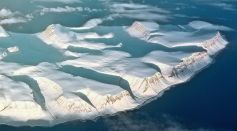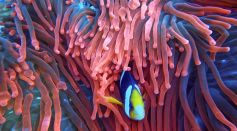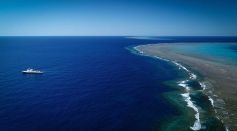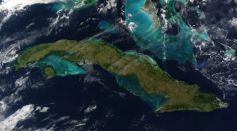Tags: Ocean acidification
BMED System: New Electrochemical Technology to Combat Ocean Acidification, CO2 Emissions
Antarctic Waters Acidity Could Double by 2100, Threatening the Future of Marine Life in the Southern Ocean
Southern Ocean Sea Butterflies at Risk as Ocean Warming and Acidification Emerge Due to Climate Change

Dungeness Crabs Are Losing Their Sense of Smell Due to Climate Change, New Study Reveals; Findings Partially Explain Their Population Decline

Arctic Ocean Becomes More Acidic Due to Melting Ice [Study]

Effects of Coral Diversity Decline May Lead to 40% Reduction in Reef Fish Diversity, Study Says
Ancient Marine Creature Reveals the Events of the Permian-Triassic Mass Extinction

The Schmidt Family Foundation Gives Two Grants for Climate Change Research

Phytoplankton Are Causing a 'Significant Regime Shift' in the Arctic Ocean
Acidification on the Arctic Ocean Is Worse Than Expected Threatening Calcifying Organisms and the Food Chain
Ocean Acidification Threats Emerge From Southern Seas
Ocean Acidification Is Killing Coral Reefs
Ocean Acidification Has Affected California, According to Oregon State University's Study
Ocean Acidification Makes Salmons Lose Ability To Sense Predators, According To Researchers From The University Of Washington
Coral Protection and How Humans Can Save These Ocean Flowers Against Climate Change
Cold-Water Coral Name Lophelia Pertusa Maintain It's Growth Even In Ocean Acidification At Rising Sea Temperature
Reef Oasis Found in Depths of Murky Iraqi Waters
Researchers Find How Acidified Oceans Have Become with Help of NASA and ESA Satellites
Most Popular

Starlink Satellite Explodes in Orbit; SpaceX Confirms It'll Re-Enter Earth

Aurora Phenomenon: How Geomagnetic Storms and Space Weather Are Lighting Up the World

Ocean Warming Explained: Why Climate Science Shows Sea Temperature Rise Is Speeding Up

How Wildfires Start, Spread, and Ignite: Understanding the Causes and Fire Behavior Clearly





